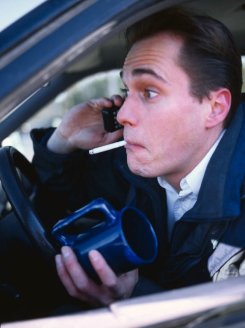23 January 2013
Multitasking: you're bad at it
by Will Parker
 Most people believe they can multitask effectively, but a new University of Utah study indicates that the people who multitask the most are the people least capable of doing so.
Most people believe they can multitask effectively, but a new University of Utah study indicates that the people who multitask the most are the people least capable of doing so.
"What is alarming is that people who talk on cells phones while driving tend to be the people least able to multitask well," lamented Utah U's David Sanbonmatsu, a senior author of the study. "We showed that people who multitask the most are those who appear to be the least capable of multitasking effectively."
The new study, detailed in PLOS ONE, ran more than 300 undergraduate students through a battery of tests and questionnaires to measure: actual multitasking ability, perceived multitasking ability, cell phone use while driving, use of electronic media, and personality traits such as impulsivity and sensation-seeking.
Actual multitasking ability was measured with a test named Operation Span (OSPAN). The test involves two tasks: memorization and math computation. Participants must remember two to seven letters, each separated by a math equation that they must identify as true or false. A simple example of a question: "is 2 4=6?, g, is 3-2=2?, a, is 4x3=12." Answer: true, g, false, a, true.
Amongst the key findings:
- The people most capable of multitasking effectively were not the persons who were most likely to engage in multitasking.
- The more people multitask by talking on cell phones while driving or by using multiple media at once, the more they lack the actual ability to multitask.
- Seventy percent of participants thought they were above average at multitasking - which is statistically impossible.
- Ironically, the people who could actually multitask effectively tended not to, so they could better focus their attention on the task at hand.
- People with high levels of impulsivity and sensation-seeking reported more multitasking.
- The research suggests that people who engage in multitasking often do so not because they have the ability, but "because they are less able to block out distractions and focus on a singular task."
"One of the main reasons people multitask is because they think they are good at it," Sanbonmatsu noted. "But our study suggests people rarely are as good at multitasking as they think they are."
"If you have people who are multitasking a lot, you might come to the conclusion they are good at multitasking. In fact, the more likely they are to do it, the more likely they are to be bad at it," added co-researcher David Strayer.
The researchers think that impulsivity and sensation seeking may play a part in our misjudged multitasking abilities. "Impulsive people tend to be more reward-oriented and more apt to take risks, so they may be less sensitive to the costs of multitasking," the study notes. "Multitasking, including cell phone use while driving, correlated significantly with sensation-seeking, indicating some people multitask because it is more stimulating, interesting and challenging, and less boring - even if it may hurt their overall performance."
Related:
Discuss this article in our forum
Self-delusion a winning strategy in life
Forgetful? Blame your house
Nicotine patches reduce senior moments
Source: University of Utah
